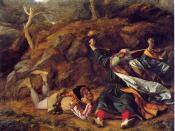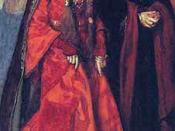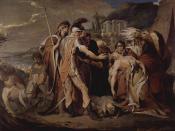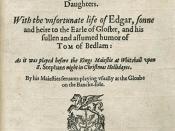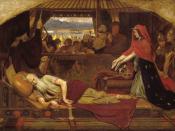King Lear Essay-AuthorityIn this world, people constantly take things for granted. In the last century, the world has seen many dictators, tyrants, and many leaders who hesitated to take action against them. Overtime many leaders have abused the authority they were given, or they overreached their bounds. Many also hesitated to do what was truly right, in order to save themselves the trouble. In a time where freedom, safety, and equality are so important, authority figures need to learn to use power responsibly. In the play King Lear by William Shakespeare, many characters abuse their authority, causing negative things to happen. Most of them learn from it which endows them with new wisdom and the ability to use their authority responsibly. In some cases, people overreach the appropriate level of their authority, making irrational decisions which cause them to have unpleasant experiences. This grants them new sight of their responsibility to use their power wisely.
Additionally, people at times exploit their authority by misleading other people, this selfish decision results in negative consequences. Through these consequences, they are able to realize that they should use their authority responsibly. And finally, when people misuse their authority by failing to exert it properly, it results in hesitation when making decisions, which results in negative experiences. This negative consequence allows this person to realize that they have to use their authority in a conscientious way. Moreover, people who misuse their authority make unintelligent decisions resulting in undesirable outcomes. Through these negative experiences, they realize that their authority must be used in a responsible manner.
In some instances, characters overreach the bounds of their authority, making irrational decisions which cause them to have unpleasant experiences. These negative experiences give them the ability to realize that their authority is to be used sensibly. The character of King Lear starts off the play by displaying his power to all people present at the ceremony where he will divide his lands. Unfortunately he is in a mood that anyone whom he believes disrespects his authority is to be banished. Cordelia refuses to profess her love to her father in order to receive a piece of his land. King Lear reacts to this quite irrationally; he assumes that Cordelia merely does not love him. Being his favorite daughter, this strikes an enormous blow to Lear's ego. So in his haste, Lear irrationally decides to use his authority irresponsibly in order to banish Cordelia from his lands. Lear does not realize the repercussions of his actions:Here I disclaim all my paternal care,Propinquity and property of blood,And as a stranger to my heart and meHold thee from this for ever. (i, i, 115-118)Lear believes that he is all-mighty and deserves exceptional treatment from his daughters. He believes that he should be showered with love and affection before he gave them anything. Lear overreaches the limits of his power. For him to banish his daughter because she refused to use her love to gain anything from him, was an irrational decision. Lear is now faced with his two remaining daughters, whom now will receive all the power once held for Cordelia. Lear's hasty decision has left him in a tight bind, because he is now alone in the hands of his two eldest daughters, who both harbor a need for reprisal. For this irrational decision, King Lear inevitably has to pay a harsh price. He misuses his authority in order to seem more powerful, but his overbearing authority only adds to the ensuing consequences.
King Lear's actions cause unfortunate events to take place soon after this incident. He begins to experience negative consequences, such as a gradual deterioration in his mental health, which is caused by the torment at the hands of his vengeful daughters. Lear's demanding attitude, which he presumably had most of his life, caused his daughters to feel some resentment for the luxuries that were kept from them. Lear's constant demand for attention caused tension between all the sisters, especially between Cordelia, and the two eldest. Goneril and Regan now endowed with the power held away from them for so long, felt compelled to make their father pay for it. They wanted to take revenge on him now that he did not have his dear Cordelia, whom they both resent. Slowly his overbearing attention grabbing, and entourage of 100 men, began to aggravate Goneril and Regan so they chose to take action against him, in order to attain the most benefit from their new found powers. Lear, throughout the play, displays many instances in which he has caused himself to be in an unfortunate situation with no way out:Goneril: Hear me, my lord.
What need you five-and-twenty, ten, or five,To follow in a house where twice so manyHave a command to tend you?Regan: What you need one?Lear: O, reason not the need!Out basest of beggarsAre in the poorest thing superfluous.(ii, iv, 250-265)Lear has to live with the consequences of his overreaching and hasty actions. For so long King Lear has been accustomed to the life of a King, and now he has given up his powers and passed them onto his daughters. Despite this, King Lear still expects to receive the same treatment and attention, even though he now has no real power. Lear's misuse of his authority unavoidably caused backlash from the people whom it affected. Goneril and Regan make sure that his power is completely gone so they may guarantee that this newly established power remains theirs permanently. This is a result of the oppression Lear put on his daughters for so long. He now wants the same privileges as he once had when he was a King, yet really he is now only a figure head of his empire. Goneril and Regan are forced into childish means of punishing Lear for what he has done to them, and in essence, they desire to make his life a living hell. This torment that Lear faces because of his daughters causes his judgment to become poor, and lays the foundation for the gradual deterioration of his mental health:Lear: Thou art the thing itself; unaccomodated manIs no more but such a poor, bare, forked animal asThou art. Off, off, you lendings! Come, unbutton here.
[Tearing his garments] (ii, iv, 104-109)He has been driven to strip from his clothes and bare all. This is symbolic of the very depth of his mental state. Following this, Lear's situation begins to improve. Because of Lear's irresponsible actions, in banishing Cordelia, he is now falling into a state of despair and misfortune. He wanders the land trying to find sanity in his surroundings. He begins to relate to a poor beggar, and this is when he truly becomes mad. Finally he is brought to safety where hopefully he can recover from this mental strain.
The unfortunate actions caused by Lear's abusive behavior begin to lend new sight to Lear who was once blind to the impact of his actions. Lear's deteriorated mental health ironically grants him a heightened level of clarity in order to realize his faulty decisions, and the consequences that came of them. Lear's removal from power allows him to be detached from the situation which allows him to begin to realizing what is truly important. Lear is left out in the cold to fend for himself and he realizes that the faults he saw in his daughter Cordelia for denying him, now seem to pale in comparison to those of his eldest daughters. This proves that he is now realizing Cordelia's benevolence, and perhaps the fact that he should not have taken her words for face value, and that possibly he should not have abused his powers to get rid of her:Lear: Be your tears wet? Yes, faith. I pray weep not.
If you have poison for me, I will drink it.
I know you do not love me, for your sistersHave, as I do remember, done me wrong:You have some cause, they have not.
(iv, vii, 71-74)He now realizes that maybe Cordelia's faults seemed disrespectful at the time; he now realizes that these faults are much less severe than Goneril and Regan's. This realization is a result of his power abuse, as it caused him to banish his favorite daughter without first thinking logically. This banishment allowed the two remaining daughters to become vengeful and attain more power than was initially planned. For them this new power was the means to get the revenge that they were longing for. The havoc they cause, and the mental anguish that they inflict on King Lear, causes him to lose control of himself and become mentality unstable. But through this instability, Lear begins to see the true benefit of his power, and he realized that he has to be answerable to it. He realized that he was blinded by his power and that this new found clarity can help him to realize what is truly important. Lear now realizes that if he had used his authority wisely he could have saved his most beloved daughter Cordelia:Lear: A plague upon you, murderers, traitors all!I might have saved her; now she's gone for ever!â¦I killed the salve that was a-hanging thee.
(v, iii, 269-273)King Lear realizes that if he had not banished her, and given all of his power to Goneril and Regan, he may have been able to save her from this terrible fate. He may have been able to prevent all of this from happening, if he had just used his powers wisely. This also exhibits a new way in which he uses his authority; he tried to do the noble and honorable thing, by killing the man who is attempting to hang his daughter. Though he is too late, he realizes that he should be using his power to punish those who deserve it, rather than abusing it and causing trouble for himself and the ones he loves. Lear realized that he should be using his authority wisely, and that is what is truly important.
In addition to people who abuse authority to gain false power, there are people who, at times, exploit their authority by being deceptive towards other people. This selfish choice results in negative consequences for the perpetrator. As a result of these consequences, they are able to realize that they should use their authority responsibly, to do good, not evil. In this play, characters like Edmund often use their authority over another person, in order to mislead them. Edmund uses his authority with his father in order to deceive him, by pretending to be innocent of Edgar's intentions. Edmund brings forth a forged letter to his father. The letter contains Edgar's intentions to creep around Gloucester's back in order to gain more power for Edgar and himself. Gloucester is so outraged by this letter, that he cannot believe that Edmund would fabricate such a horrible thing, nor that Edgar would write it. He has no reason to believe otherwise since Edmund seems so innocent:Gloucester: Hum! Conspiracy? "Sleep till I waked him, you shouldEnjoy half his revenue." My son Edgar! Had he aHand to write this? A heart and a brain to breed it in?When came you to this? Who brought it?Edmund: it was not brought to me, my lord; there's theCunning of it. I found it thrown in at the casement ofMy closet. (i, ii, 55-61)This further proves that Gloucester is so easily convinced of this letter's truth, that he is automatically and immediately angry towards his son Edgar. Edmund is aware of this character flaw in Gloucester and he plays on it. Edmund uses his father's good natured heart to his advantage, by seeming innocent and arguing that it could not possibly be a real letter from Edgar. In doing so he turns all possible blame away from himself. This is a selfish decision on Edmund's part. He is breaking apart his family in order to gain personal power and by altering the truth, he realizes that he can attain his goal. Edmund uses his authority and power over his father in order to deceive him, but this selfish decision results negative outcomes for Edmund.
Edmunds abusive actions cause his life to somewhat improve for the short run, but soon after this abuse has taken place, people begin to find out about his treachery:Albany: This shows you are above,You justicers, that these our nethercrimesSo speedily can venge! But o poor Gloucester!Lost he his other eye? (iv, ii, 78-81)Edmund's selfish actions and power abuse have now landed him in an unfavorable position. Many people have now found out about the betrayal of his father. People loyal to Gloucester are outraged and vow to take revenge upon him. If Edmund had not used his authority irresponsibly in order to deceive his father and lead him into his plot, all of these men faithful to Gloucester would not be after his life. Because of Edmund's selfish actions, he is now having dire consequences. Edmund eventually pays the ultimate price for his betrayal:Edgar: â¦Despite thy victor sword and fire-new fortune,Thy valour and thy heart, thou art a traitor,False to thy gods, thy brother, and thy father;Conspirant 'gainst this high illustrious prince;And from th' extremest upward of thy headTo the decent and dust benath thy foot,A most toad-spotted traitor. Say thou "no,"This sword, this arm, and my best spirits are bentTo prove upon thy heart, whereto I speak,Thou liest. (v, iii, 132-141)Edmund is now faces the worst result possible for his actions. If he had not betrayed his father, by abusing his authority and misleading him, his brother Edgar would not have taken his life. Because of his abusive use of authority, he caused negative things to happen in his life. The outcome of his actions is losing his life, the ultimate punishment. Had he kept his vengeful thoughts towards his father and brother inside then he would not have caused this end result for himself. He could have been saved from this fate. Had Edmund not mislead his father, betrayed his brother, and used his power selfishly, all of this could have been prevented, however, these unfortunate events enabled Edmund to gain something other than power.
Once Edmund has committed these offenses, it results in fateful events which fortunately evolve to shed new light for those who committed the offense. The most important and significant instance in which Edmund abuses his power is when he misleads his trusting father. Edmund lies to him, because he is aware of his father's character and knows that he will believe him, Edmund then goes on to cause his father to have his eyes plucked out:Albany: Knows he the wickedness?Gentleman: ay, my good lord: 'twas ho informed against him,And quit the house on purpose, that their punishmentMight have been the freer course. (iv, ii, 91-95)Edmunds actions cause dire consequences for him, but through these negative experiences, he is able to see his major fault. Edmund realizes that he should have used his powers responsibly; he should have been like Edgar. Edgar, who was noble and true, was loved, while he was merely lusted for. The consequences for Edmund are great, he has been stabbed, and lost his two loves, and this opens his eyes to realize what he should have done all along. Edmund finally realizes that in these dying breaths, he wants to do something good so he attempts to save Lear and Cordelia from being hanged:Edmund: I pant for life. Some good I mean to do,Despite of mine own nature. Quickly sendBe brief in't to the castle; for my writIs on the life of Lear and CordeliaNay, send in time. (v, iii, 243-247)Edmund now realizes that he should have used his authority wisely, to do things for good, not for evil. He did not think that he would die this young, or this quickly and he feels as though he has not fulfilled his life. He has not contributed positively. If Edmund had not misused his authority and caused unfortunate events for himself, he would never have come to this conclusion; he would never have realized that he should have used his power wisely, to save someone. This nonetheless proves that when people use their power irresponsibly; they are forced into negative situations. Yet through those consequences, they are able to realize that their authority should be used for the greater good.
People who misuse their authority by failing to apply it responsibly, make irrational decisions, which result in negative experiences. This negative consequence allows this person to realize that they have to use their authority in a conscientious way. When Gloucester is presented by Edmund, a letter supposedly from Edgar, he misused his power and authority to banish his son Edgar at once. Gloucester reads the letter; it mentions conspiracy and betrayal. Gloucester is so appalled by this letter that he banishes his son Edgar before giving him the chance to explain his actions. Gloucester misuses his power by immediately believing his son Edmund, and hastily jumping to conclusions:Gloucester: o villain, villain! His very opinion is the letter!Abhorred villain! Unnatural, detested, brutish villain!Worse then brutish! Go, sirrah, see him. Ill apprehendHim. Abominable villain! Where is he? (i, ii, 75-78)Gloucester judges Edgar without giving the situation time to sink in. He makes hasty decisions because of irrational behavior and he causes his most loved son to get banished. Had Gloucester used his authority wisely, and questioned Edmund and possibly found a flaw in his argument, he would have never caused this unfortunate event to unfold. If Gloucester had used his authority wisely, he could have exerted his power over Edmund to punish him for his treason and conspiracy.
When Gloucester failed to exert his power responsibly, he failed to contain the situation; this caused dire consequences for him. As a result of this failure, he is thrown into a series of events that eventually leave his senses paralyzed. As a result of Gloucester's inaction, he has allowed certain people to run rampant. Gloucester's failure to use his powers responsibly and stop his bastard son from gaining so much power, results in dreadful effects for him. Edmund informs lady Regan and her husband Cornwall that Gloucester has 'betrayed' them. Regan and Cornwall decide to punish Gloucester for this 'disloyalty', and they promptly pluck out his eyes. This is the ultimate punishment for Gloucester:Regan: Wherefore to Dover?Gloucester: Because I would not see thy cruel nailsPluck out his poor old eyesâ¦Cornwall: see it shalt thou never. Fellows, hold the chair.
Upon these eyes of thine I'll set my foot.
Gloucester: he that will think to live till he be old,Give me some help! - O cruel! O you gods! (iii, vii, 56-71)Because of Gloucester's inability to judge clearly, and use his authority wisely he has inevitably caused this most unfortunate thing to happen. This event unfortunately robs him of one of his senses, literally, yet endows him with another, figuratively. This proves that the event is caused directly because of Gloucester's inability to take action on people. Gloucester misinterpretation, and inability to see what was truly happening around him, caused his decisions to come too little, too late. These consequences do however have a somewhat beneficial outcome.
When Gloucester has his eyes removed, it allows him to figuratively 'see' clearly. He now has heightened clarity and judgment of his actions and surroundings. Gloucester then realizes that he should have helped King Lear to begin with; he should have trusted Edgar over Edmund, or merely given his decision time to sink in. Gloucester's greatest misuse was to allow Edmund to mislead him into banishing the only person who could have prevented this. Gloucester's inability to take action soon enough to prevent all this from happening ends up with getting his eyes plucked from their sockets. Gloucester is now left in the dark and alone, he does not know where his beloved son Edgar is, and he is ready to end his life: "There is a cliff, whose high and bending head Looks fearfully in the confirmed deep. Bring me to the very brim of it," (IV, I, 75-77). It takes this kind of lowly thinking, to finally realize that there is no way but up. Gloucester now begins to realize that his power should have been used for good; he could have stopped all this from happening if only he has exercised his authority, and been able to see who was truly loyal:Gloucester: I have no way, and therefore want no eyes;I stumbled when I saw⦠O dear son Edgar,The food of thy abused father's wrath;Might I but live to see thee in my touch,I'd say I had eyes again! (iv, i, 18-24)Gloucester realizes that he has misused his authority. He banished his good son who could have protected him, if only he had acted against Edmund when he began to siphon his father's authority. This could have prevented losing his eyes, and he could have kept his dear son Edgar, whom he thinks is now gone forever. In the end, it takes unfortunate events for Gloucester to realize that he should have used his authority consciously. Eventually, Gloucester learns what and who is truly important. It took losing his eyes, for him to finally see.
In the play King Lear by William Shakespeare, many characters abuse the reaches of their authority, which causes unfortunate things to happen. These characters learn from their experiences which bestows in them a new wisdom and therefore an ability to use their authority responsibly. In some cases, people exceed their limit of authority, causing them to make irrational decisions. These decisions eventually cause them to have unlikable experiences. This grants them the ability to see the benefits and responsibility of using their power wisely. In addition to this, people at times exploit their authority by bending the truth. This selfish decision results in negative consequences. In light of these consequences, they are able to realize that they should be using their authority conscientiously. To conclude, when people misuse their authority by failing to exert it, it results in hesitation when making decisions, which results in negative experiences. This negative consequence allows this person to realize that they have to use their authority in a careful manner. Moreover, people who misuse their authority make unintelligent decisions resulting in undesirable outcomes. Through these negative experiences, they realize that their authority must be used in a responsible manner. Learning from mistakes is what makes humans so remarkable, just as the famous quotation says "to err is human, to forgive is divine". In fact all people make a mistake now and again, which sometimes causes undesired results. The most important part is that one can always learn from their mistakes.
Shakespeare, William. King Lear. Toronto: Harcourt Brace & Company Canada Inc. 1990.
